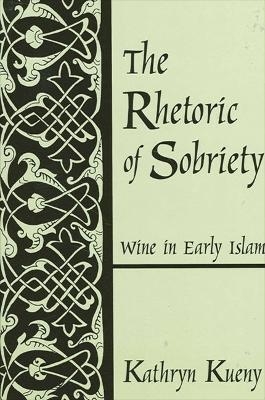
The Rhetoric of Sobriety
Wine in Early Islam
Seiten
2001
State University of New York Press (Verlag)
978-0-7914-5053-6 (ISBN)
State University of New York Press (Verlag)
978-0-7914-5053-6 (ISBN)
- Titel z.Zt. nicht lieferbar
- Versandkostenfrei
- Auch auf Rechnung
- Artikel merken
Explains the prohibition of alcohol in Islam using a wide range of materials from the early Islamic period.
Why does Islam condemn wine and other alcoholic beverages? The complexity behind this simple question is examined in The Rhetoric of Sobriety. Drawing on an array of revelatory, legal, historical, and exegetical materials (both Sunni and Shi'ite) from the early Islamic period, and contrasting them with comparable Judaic and Christian works from the same era, the author analyzes the rhetoric used to establish the proper authoritative boundaries that would contain wine's ambiguous nature. How believers chose to identify wine as a marginal substance and assert its prohibition offers a rare glimpse into the underlying intellectual strategies of early Muslim thought to resolve conflict, create meaning, structure the world, govern human behavior, and convey the divine message. Ultimately, this examination reveals some of the ways in which the early Islamic community created its identity, and asserted it over other confessional groups with similar convictions.
Why does Islam condemn wine and other alcoholic beverages? The complexity behind this simple question is examined in The Rhetoric of Sobriety. Drawing on an array of revelatory, legal, historical, and exegetical materials (both Sunni and Shi'ite) from the early Islamic period, and contrasting them with comparable Judaic and Christian works from the same era, the author analyzes the rhetoric used to establish the proper authoritative boundaries that would contain wine's ambiguous nature. How believers chose to identify wine as a marginal substance and assert its prohibition offers a rare glimpse into the underlying intellectual strategies of early Muslim thought to resolve conflict, create meaning, structure the world, govern human behavior, and convey the divine message. Ultimately, this examination reveals some of the ways in which the early Islamic community created its identity, and asserted it over other confessional groups with similar convictions.
Kathryn Kueny is Assistant Professor of Religious Studies at Lawrence University.
Acknowledgments Introduction
1. Qur'anic Vignettes of the Vine: Prophetic Discourse and the Signs for Those Who Know
2. Finding the Perfect World: Analytic Discourse and the Quest for Order
3. Links to a Sacred Past: Narrative Discourses and the Refining of Communal Identity
4. A Brief Word on the Poetic Portrayal of Wine
5. Wine and Mystical Utterance
Conclusions and Future Comparative Directions
Notes
Bibliography
General Index
Works Quoted
| Erscheint lt. Verlag | 9.8.2001 |
|---|---|
| Zusatzinfo | Total Illustrations: 0 |
| Verlagsort | Albany, NY |
| Sprache | englisch |
| Maße | 152 x 229 mm |
| Gewicht | 390 g |
| Themenwelt | Geisteswissenschaften ► Religion / Theologie ► Islam |
| ISBN-10 | 0-7914-5053-8 / 0791450538 |
| ISBN-13 | 978-0-7914-5053-6 / 9780791450536 |
| Zustand | Neuware |
| Informationen gemäß Produktsicherheitsverordnung (GPSR) | |
| Haben Sie eine Frage zum Produkt? |
Mehr entdecken
aus dem Bereich
aus dem Bereich


